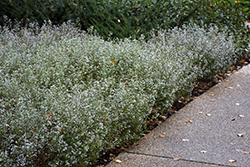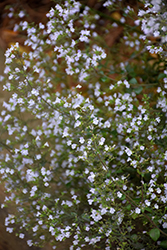Plant Height: 12 inches
Flower Height: 18 inches
Spread: 24 inches
Sunlight:
![]()
![]()
Hardiness Zone: 4
Description:
A compact bushy selection featuring aromatic green leaves with clusters of lilac colored flowers; minty-lemon scent is released when foliage is brushed against or bruised; a lovely addition to borders, beds and containers; easy to grow and low maintenance
Ornamental Features
Dwarf Calamint features dainty spikes of lilac purple trumpet-shaped flowers rising above the foliage from early summer to early fall. Its fragrant oval leaves remain green in color throughout the season.
Landscape Attributes
Dwarf Calamint is an herbaceous perennial with an upright spreading habit of growth. Its relatively fine texture sets it apart from other garden plants with less refined foliage.
This plant will require occasional maintenance and upkeep, and is best cleaned up in early spring before it resumes active growth for the season. It is a good choice for attracting bees to your yard. Gardeners should be aware of the following characteristic(s) that may warrant special consideration;
- Self-Seeding
Dwarf Calamint is recommended for the following landscape applications;
- Mass Planting
- Rock/Alpine Gardens
- Border Edging
- General Garden Use
- Herb Gardens
Planting & Growing
Dwarf Calamint will grow to be about 12 inches tall at maturity extending to 18 inches tall with the flowers, with a spread of 24 inches. It grows at a medium rate, and under ideal conditions can be expected to live for approximately 10 years. As an herbaceous perennial, this plant will usually die back to the crown each winter, and will regrow from the base each spring. Be careful not to disturb the crown in late winter when it may not be readily seen!
This plant does best in full sun to partial shade. It prefers to grow in average to moist conditions, and shouldn't be allowed to dry out. It is not particular as to soil type or pH. It is somewhat tolerant of urban pollution. This species is not originally from North America. It can be propagated by division.

